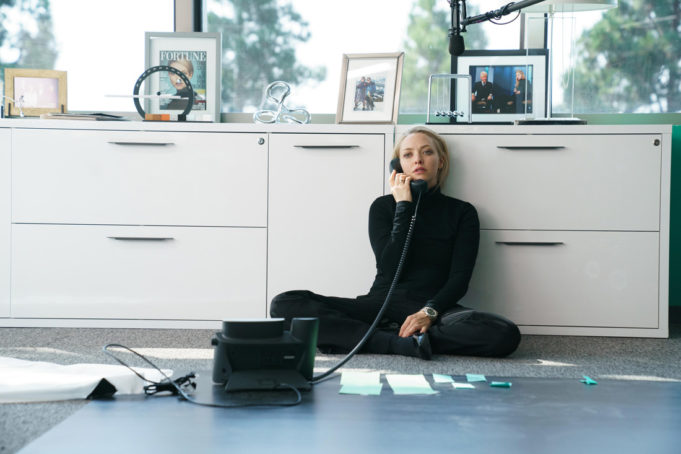It is so fascinating to watch Amanda Seyfried’s lead performance in The Dropout. This actress has taken on romances like Letters to Juliet, shown off her musical-theater chops in Mamma Mia!, and garnered a long-overdue Oscar nomination for 2020’s Mank, but she is most memorable when exploring extreme psychological states, as in her fearless turns as the repressed teen in Jennifer’s Body and the young mother with postpartum depression in A Mouthful of Air. On the Hulu miniseries, she plays Elizabeth Holmes, the CEO of Theranos who made billions with blood-testing technology that didn’t exist, and Seyfried makes this fraudster into a strange and fascinating bird indeed.
The series begins with Elizabeth’s childhood in Houston, where, having gained early admission to Stanford, she’s already planning to drop out like her idols Bill Gates and Steve Jobs to start a billion-dollar tech company. As a pre-med student who shares her mother’s phobia about seeing her own blood, she envisions a small device that will test a patient for 70 different diseases with only one drop of blood, delivering results within minutes instead of requiring days for lab analysis. Her family wealth enables her to found her startup in Palo Alto, and early trials of the device come through, but she and her sales team are in Switzerland to demo the device for Novartis when it suddenly stops working. She fakes the test results for the pharma company, starting a years-long pattern of hoodwinking investors and delivering false results to patients, along with the connivance of Sunny Balwani (Naveen Andrews), her considerably older boyfriend, COO, and designated office screamer who sends employees running out of offices in tears.
The creator of this show is Liz Meriwether, previously best known for her successful Fox sitcom New Girl. This is a character study of a very different sort of woman, a Type A among Type As with a palpable need to be perceived as a successful CEO regardless of the means. Part of this comes from her upbringing: When Elizabeth is raped at Stanford, her mother (Elizabeth Marvel) clearly speaks from her own experience when she tells her daughter to put away all her inconvenient feelings until they disappear. I do like how the show presents the sexism, corporate and otherwise, around Elizabeth without using it as an excuse for her financial crimes. Theranos’ British head chemist (Stephen Fry) succumbs to the legal pressures on him to testify about the company’s misdeeds, and Elizabeth’s reaction to hearing of his suicide is perfectly chilling. The same applies to a late confrontation between Elizabeth and Sunny after Theranos’ public implosion, and the two domestic partners jockey to position the other one as the villain responsible for it all.
Contrasted with this, the show casts a dim view of the adulation of a beautiful white woman who builds a tech juggernaut before she turns 25. (This situation is always going to be catnip to more than just tech journalists. We see Holmes receiving a glowing endorsement from then-Vice President Joe Biden.) Then, too, there’s the skillful sleight-of-hand that Elizabeth and Sunny perform when the firm direly needs funding, as they pit executives from Walgreens and Safeway against each other — and against the absent CVS — to play on their FOMO and make both retailers pay for Theranos’ devices in their stores.
All this is solid, but what really breathes life into the show is Seyfried. The actress has publicly discussed her real-life OCD and how the repetitive business of acting has helped her cope with her condition. It perfectly suits her to the role of an obsessive who reacts to an explosive fight with Sunny by standing in her bathroom mirror and compulsively repeating “This is an inspiring step forward,” a phrase from a planned speech to her shareholders. (We also see her practicing the artificially deep voice that contributed to Holmes’ infamy even more than her scientific and financial shenanigans.) The Dropout emerges as the tragedy of a woman who can’t let anyone see her vulnerable, driven insane by the various pressures applied by herself, her family, the business world, and social media. Maybe the most indelible scene comes at the very end, after Elizabeth leaves her deserted former corporate headquarters for the last time with the words of her ex-legal counsel (Michaela Watkins) ringing in her ears: “You hurt people, Elizabeth!” Standing alone by the road, she screams a scream of primal rage at everything that led her to this disgrace, including herself. Then her Uber driver pulls up, and her smile flicks back on like a torch as she greets him. The mask must never slip, no matter how exhausting it is to keep it up.












